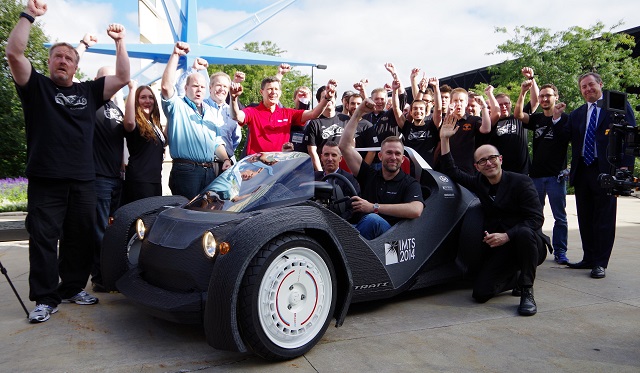
Meet the Strati, the world's first 3D-printed car.
Image credit: Business Wire
Local Motors, along with a team of industry experts, Oak Ridge National Laboratory, Cincinnati Incorporated, and The Association For Manufacturing Technology (AMT) launched the world’s first 3D-printed car in McCormick Place, Chicago, on September 13, 2014.
As part of a victory lap, John B. Rogers, CEO of Local Motors, accompanied by AMT President Doug Woods, drove the car around at the six-day show.
Called the Strati, the drivable car was assembled in three separate phases. In the first phase, additive manufacturing technique was used to print the car in 3D format on a Cincinnati’s Big Area Additive Manufacturing Machine (BAAM); the second phase, called subtractive manufacturing, involved a single day of milling on a machine; and in the last phase assembly and finishing touches were made to the car.
Using 3D printing, the collaborative team had redefined the concept of car manufacturing. For instance, the quantity of car components has been reduced from 25,000 to a mere 50 and the car was built within a period of six months. This signifies a remarkable feat in the automotive industry.
Other industry experts who contributed to building the car were Renault, SABIC Innovative Plastics, Fifteen52 and Siemens. Renault gifted the powertrain from its Twizy electric vehicle; SABIC Innovative Plastics supplied the ABS plastic, Fifteen52 fabricated custom wheels to complement the design; and Siemens supplied the Solid Edge® software for the design elements.
The software in particular proved useful in preparing the car for 3D printing. The design files were not built with the 3D printed part of the car, and therefore almost all the components had to be accommodated into the new chassis. However, the Solid Edge® software allowed the team to adjust components and customize intermediate structures that could be easily mounted onto the carbon and ABS material extruded by the 3D printer.